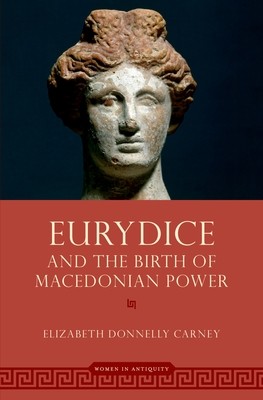
- We will send in 10–14 business days.
- Author: Elizabeth Donnelly Carney
- Publisher: Oxford University Press, USA
- ISBN-10: 0190280530
- ISBN-13: 9780190280536
- Format: 15.8 x 23.9 x 2.5 cm, hardcover
- Language: English
- SAVE -10% with code: EXTRA
Eurydice & Birth of Macedon Power Wia C (e-book) (used book) | bookbook.eu
Reviews
Description
Eurydice (c.410-340s BCE) played a significant part in the public life of ancient Macedonia, the first royal Macedonian woman known to have done so, though hardly the last. She was the wife of Amyntas III, the mother of Philip II (and two other short-lived kings of Macedonia), and grandmother of Alexander the Great. Her career marks a turning point in the role of royal women in Macedonian monarchy, one that coincides with the emergence of Macedonia as a great power in the Hellenic world. This study examines the nature of her public role as well as the factors that contributed to its expansion and to the expanding power of Macedonia.
Some ancient sources picture Eurydice as a murderous adulteress willing to attempt the elimination of her husband and her three sons for the sake of her lover, whereas others portray her as a doting and heroic mother whose actions led to the preservation of the throne for her sons. While the latter view is likely closer to historical reality, both the "good" and "bad" Eurydice traditions portray her as the leader of a faction, an active figure at court and in international affairs. Eurydice's activity, sinister or not, directly related to the fact that, at the time of her husband's death, the eldest of her three sons was barely old enough to rule and enemies, foreign and domestic, threatened.Ã Two of Eurydice's sons were assassinated and the third died in battle. Eurydice functioned not only a succession advocate for her sons but she also played a part in the construction of the public image of the dynasty, both because of her own actions and because of the ways in which her son Philip II chose to depict and commemorate her. Drawing on recent archaeological discoveries and all surviving literary evidence, this portrait illuminates the life of a remarkable queen at the birth of a celebrated epoch.EXTRA 10 % discount with code: EXTRA
The promotion ends in 19d.20:44:04
The discount code is valid when purchasing from 10 €. Discounts do not stack.
- Author: Elizabeth Donnelly Carney
- Publisher: Oxford University Press, USA
- ISBN-10: 0190280530
- ISBN-13: 9780190280536
- Format: 15.8 x 23.9 x 2.5 cm, hardcover
- Language: English English
Eurydice (c.410-340s BCE) played a significant part in the public life of ancient Macedonia, the first royal Macedonian woman known to have done so, though hardly the last. She was the wife of Amyntas III, the mother of Philip II (and two other short-lived kings of Macedonia), and grandmother of Alexander the Great. Her career marks a turning point in the role of royal women in Macedonian monarchy, one that coincides with the emergence of Macedonia as a great power in the Hellenic world. This study examines the nature of her public role as well as the factors that contributed to its expansion and to the expanding power of Macedonia.
Some ancient sources picture Eurydice as a murderous adulteress willing to attempt the elimination of her husband and her three sons for the sake of her lover, whereas others portray her as a doting and heroic mother whose actions led to the preservation of the throne for her sons. While the latter view is likely closer to historical reality, both the "good" and "bad" Eurydice traditions portray her as the leader of a faction, an active figure at court and in international affairs. Eurydice's activity, sinister or not, directly related to the fact that, at the time of her husband's death, the eldest of her three sons was barely old enough to rule and enemies, foreign and domestic, threatened.Ã Two of Eurydice's sons were assassinated and the third died in battle. Eurydice functioned not only a succession advocate for her sons but she also played a part in the construction of the public image of the dynasty, both because of her own actions and because of the ways in which her son Philip II chose to depict and commemorate her. Drawing on recent archaeological discoveries and all surviving literary evidence, this portrait illuminates the life of a remarkable queen at the birth of a celebrated epoch.

Reviews